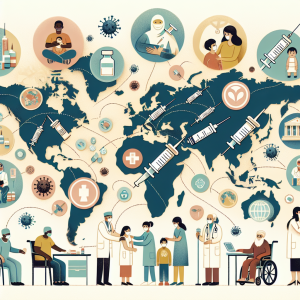
The Intersection of Mental Health and Vaccine Trust
Alarming statistics from the United Nations indicate a growing trust crisis impacting vaccine rollouts globally. The report, highlighting the “information and trust crisis” concerning vaccines, poses a significant threat to immunization efforts and the fight against preventable diseases.
This trust crisis coexists with another burgeoning issue: mental health, as reported by the UN Secretary-General in statements before the General Assembly, stressing the need for a global approach to mental health. Such overlapping challenges beg for an integrated strategy to address the multifaceted issues influencing public health globally.
The Core of the Trust Crisis
The UN World Health Organization (WHO) has noted that public trust issues have undermined efforts to maintain polio eradication and measles elimination. The complexities involved in vaccine hesitancy are rooted deeply in misinformation propagated through various media, which has fueled skepticism, particularly in communities with historical and cultural skepticism towards vaccinations.
A similar sentiment about the trust issues affecting global public health initiatives was echoed in recent reports about misleading interpretations of health data, emphasizing the dire need for consistent and clear communication from health organizations worldwide.
Linking Mental Health and Vaccine Trust
Concurrently, the surge in mental health conditions reported by the WHO, affecting over a billion people worldwide, paints a picture of a global crisis that requires urgent attention. The General Assembly’s discussions around mental health last month underscore a crucial intersection with the ongoing vaccine crisis.
Mental health challenges exacerbate trust issues. Distrust in medical systems often parallels a lack of understanding or access to mental health support. As individuals grapple with anxiety and depression, such states can amplify fears and doubts about the safety and reliability of vaccines. A case in point is the legal controversies surrounding vaccine mandates, where public figures have been influential in spreading vaccine mistrust.
Strategies for Addressing These Challenges
What is needed now is a holistic approach to public health that integrates mental health support strategies with vaccine advocacy plans. This approach should be multi-pronged:
- Trust-Building Initiatives: Public health campaigns must prioritize transparent communication and community engagement. Addressing historical grievances and leveraging trusted community leaders can bridge the gap between health officials and skeptical populations.
- Enhancing Mental Health Support: Increasing access to mental health resources and reducing stigma around mental health treatment can create more resilient communities that are better equipped to manage vaccine hesitancy.
- Educational Campaigns: These should focus on providing accurate information about vaccines and mental health services, utilizing both digital platforms and traditional media to reach diverse demographics.
- Policy and Advocacy: Governments need to collaborate with health organizations to enforce policies that protect the public from misinformation, simultaneously fostering conditions for better mental health awareness and care provision.
The challenge of addressing public health holistically is formidable, yet it is crucial for ensuring global wellness. By integrating solutions for mental health crises with vaccine trust-building measures, a path forward can be established that could significantly enhance the effectiveness of both healthcare endeavors.
As world leaders continue to underscore the importance of mental health awareness, it is evident that public health narratives should embrace comprehensive strategies that cater to both mental and physical health landscapes.



